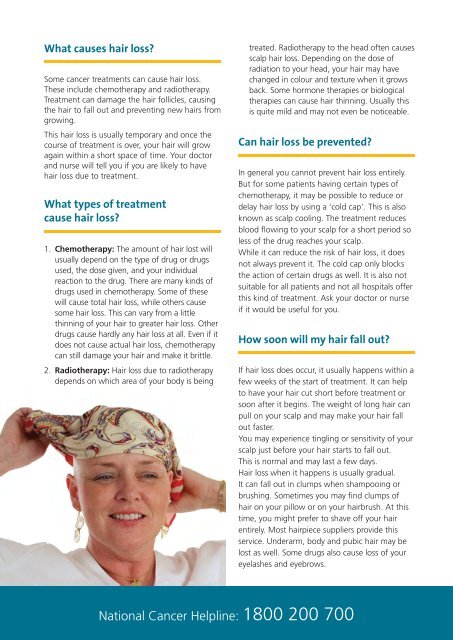Hair Loss FactSheet v8.indd - Irish Cancer Society
Hair Loss FactSheet v8.indd - Irish Cancer Society
Hair Loss FactSheet v8.indd - Irish Cancer Society
You also want an ePaper? Increase the reach of your titles
YUMPU automatically turns print PDFs into web optimized ePapers that Google loves.
What causes hair loss?<br />
Some cancer treatments can cause hair loss.<br />
These include chemotherapy and radiotherapy.<br />
Treatment can damage the hair follicles, causing<br />
the hair to fall out and preventing new hairs from<br />
growing.<br />
This hair loss is usually temporary and once the<br />
course of treatment is over, your hair will grow<br />
again within a short space of time. Your doctor<br />
and nurse will tell you if you are likely to have<br />
hair loss due to treatment.<br />
What types of treatment<br />
cause hair loss?<br />
1. Chemotherapy: The amount of hair lost will<br />
usually depend on the type of drug or drugs<br />
used, the dose given, and your individual<br />
reaction to the drug. There are many kinds of<br />
drugs used in chemotherapy. Some of these<br />
will cause total hair loss, while others cause<br />
some hair loss. This can vary from a little<br />
thinning of your hair to greater hair loss. Other<br />
drugs cause hardly any hair loss at all. Even if it<br />
does not cause actual hair loss, chemotherapy<br />
can still damage your hair and make it brittle.<br />
2. Radiotherapy: <strong>Hair</strong> loss due to radiotherapy<br />
depends on which area of your body is being<br />
treated. Radiotherapy to the head often causes<br />
scalp hair loss. Depending on the dose of<br />
radiation to your head, your hair may have<br />
changed in colour and texture when it grows<br />
back. Some hormone therapies or biological<br />
therapies can cause hair thinning. Usually this<br />
is quite mild and may not even be noticeable.<br />
Can hair loss be prevented?<br />
In general you cannot prevent hair loss entirely.<br />
But for some patients having certain types of<br />
chemotherapy, it may be possible to reduce or<br />
delay hair loss by using a ‘cold cap’. This is also<br />
known as scalp cooling. The treatment reduces<br />
blood fl owing to your scalp for a short period so<br />
less of the drug reaches your scalp.<br />
While it can reduce the risk of hair loss, it does<br />
not always prevent it. The cold cap only blocks<br />
the action of certain drugs as well. It is also not<br />
suitable for all patients and not all hospitals offer<br />
this kind of treatment. Ask your doctor or nurse<br />
if it would be useful for you.<br />
How soon will my hair fall out?<br />
If hair loss does occur, it usually happens within a<br />
few weeks of the start of treatment. It can help<br />
to have your hair cut short before treatment or<br />
soon after it begins. The weight of long hair can<br />
pull on your scalp and may make your hair fall<br />
out faster.<br />
You may experience tingling or sensitivity of your<br />
scalp just before your hair starts to fall out.<br />
This is normal and may last a few days.<br />
<strong>Hair</strong> loss when it happens is usually gradual.<br />
It can fall out in clumps when shampooing or<br />
brushing. Sometimes you may fi nd clumps of<br />
hair on your pillow or on your hairbrush. At this<br />
time, you might prefer to shave off your hair<br />
entirely. Most hairpiece suppliers provide this<br />
service. Underarm, body and pubic hair may be<br />
lost as well. Some drugs also cause loss of your<br />
eyelashes and eyebrows.<br />
National <strong>Cancer</strong> Helpline: 1800 200 700




